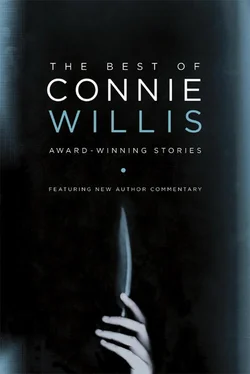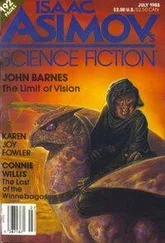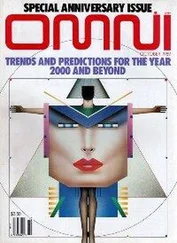“Photojournalist,” I said.
“And the Hitori you were driving belongs to the paper?”
I nodded.
“It has a phone. Why didn’t you use it to make the call?”
The uniform was bending over the Hitori.
“I didn’t realize it had a phone. The paper just bought the Hitoris. This is only the second time I’ve had one out.”
Since they knew the paper had had phones put in, they also knew what I’d just told them. I wondered where they’d gotten the info. Public phones were supposed to be tap-free, and if they’d read the license number off one of the cameras, they wouldn’t know who’d had the car unless they’d talked to Ramirez, and if they’d talked to her, she wouldn’t have been talking blithely about the last thing she needed being trouble with the Society.
“You didn’t know the car had a phone,” he said, “so you drove to—”
He consulted the readout, somehow giving the impression he was taking notes. I’d have bet there was a taper in the pocket of that shirt. “—the 7-Eleven at McDowell and Fortieth Street, and made the call from there. Why didn’t you give the Society rep your name and address?”
“I was in a hurry,” I said. “I had two assignments to cover before noon, the second out in Scottsdale.”
“Which is why you didn’t render assistance to the animal, either. Because you were in a hurry.”
You bastard, I thought.
“No,” I said. “I didn’t render assistance because there wasn’t any assistance to be rendered. The—it was dead.”
“And how did you know that, Mr. McCombe?”
“There was blood coming out of its mouth,” I said.
I had thought that that was a good sign, that he wasn’t bleeding anywhere else. The blood had come out of Aberfan’s mouth when he tried to lift his head, just a little trickle, sinking into the hard-packed snow. It had stopped before we even got him into the car. “It’s all right, boy,” I told him. “We’ll be there in a minute.”
Katie started the car, killed it, started it again, backed it up to where she could turn around.
Aberfan lay limply across my lap, his tail against the gearshift. “Just lie still, boy,” I said. I patted his neck. It was wet, and I raised my hand and looked at my palm, afraid it was blood. It was only water from the melted snow. I dried his neck and the top of his head with the sleeve of my sweater.
“How far is it?” Katie said. She was clutching the steering wheel with both hands and sitting stiffly forward in the seat. The windshield wipers flipped back and forth, trying to keep up with the snow.
“About five miles,” I said, and she stepped on the gas pedal and then let up on it again as we began to skid. “On the right side of the highway.”
Aberfan raised his head off my lap and looked at me. His gums were gray, and he was panting, but I couldn’t see any more blood. He tried to lick my hand. “You’ll make it, Aberfan,” I said. “You made it before, remember?”
“But you didn’t get out of the car and go check, to make sure it was dead?” Hunter said.
“No.”
“And you don’t have any idea who hit the jackal?” he said, and made it sound like the accusation it was.
“No.”
He glanced back at the uniform, who had moved around the car to the other side. “Whew,” Hunter said, shaking his Hawaiian collar, “it’s like an oven out here. Mind if I come in?” which meant the uniform needed more privacy. Well, then, by all means, give him more privacy. The sooner he sprayed print-fix on the bumper and tires and peeled off the incriminating traces of jackal blood that weren’t there and stuck them in the evidence bags he was carrying in the pockets of that uniform, the sooner they’d leave.
I opened the screen door wider.
“Oh, this is great,” Hunter said, still trying to generate a breeze with his collar. “These old adobe houses stay so cool.” He glanced around the room at the developer and the enlarger, the couch, the dry-mounted photographs on the wall. “You don’t have any idea who might have hit the jackal?”
“I figure it was a tanker,” I said. “What else would be on Van Buren that time of morning?”
I was almost sure it had been a car or a small truck. A tanker would have left the jackal a spot on the pavement. But a tanker would get a license suspension and two weeks of having to run water into Santa Fe instead of Phoenix, and probably not that. Rumor at the paper had it the Society was in the Water Board’s pocket. If it was a car, on the other hand, the Society would take away the car and stick its driver with a prison sentence.
“They’re all trying to beat the cameras,” I said. “The tanker probably didn’t even know it’d hit it.”
“What?” he said.
“I said, it had to be a tanker. There isn’t anything else on Van Buren during rush hour.”
I expected him to say, “Except for you,” but he didn’t. He wasn’t even listening. “Is this your dog?” he said.
He was looking at the photograph of Perdita. “No,” I said. “That was my grandmother’s dog.”
“What is it?”
A nasty little beast. And when it died of the newparvo, my grandmother had cried like a baby. “A chihuahua.”
He looked around at the other walls. “Did you take all these pictures of dogs?” His whole manner had changed, taking on a politeness that made me realize just how insolent he had intended to be before. The one on the road wasn’t the only jackal around.
“Some of them,” I said. He was looking at the photograph next to it. “I didn’t take that one.”
“I know what this one is,” he said, pointing at it. “It’s a boxer, right?”
“An English bulldog,” I said.
“Oh, right. Weren’t those the ones that were exterminated? For being vicious?”
“No,” I said.
He moved on to the picture over the developer, like a tourist in a museum. “I bet you didn’t take this one, either,” he said, pointing at the high shoes, the old-fashioned hat on the stout old woman holding the dogs in her arms.
“That’s a photograph of Beatrix Potter, the English children’s author,” I said. “She wrote Peter Rabbit .”
He wasn’t interested. “What kind of dogs are those?”
“Pekingese.”
“It’s a great picture of them.”
It is, in fact, a terrible picture of them. One of them has wrenched its face away from the camera, and the other sits grimly in its owner’s hand, waiting for its chance. Obviously neither of them liked having its picture taken, though you can’t tell that from their expressions. They reveal nothing in their little flat-nosed faces, in their black little eyes.
Beatrix Potter, on the other hand, comes through beautifully, in spite of the attempt to smile for the camera and the fact that she must have had to hold on to the Pekes for dear life, or maybe because of that. The fierce, humorous love she felt for her fierce, humorous little dogs is all there in her face. She must never, in spite of Peter Rabbit and its attendant fame, have developed a public face. Everything she felt was right there, unprotected, unshuttered. Like Katie.
“Are any of these your dog?” Hunter asked. He was standing looking at the picture of Misha that hung above the couch.
“No,” I said.
“How come you don’t have any pictures of your dog?” he asked, and I wondered how he knew I had had a dog and what else he knew.
“He didn’t like having his picture taken.”
He folded up the readout, stuck it in his pocket, and turned around to look at the photo of Perdita again. “He looks like he was a real nice little dog,” he said.
The uniform was waiting on the front step, obviously finished with whatever he had done to the car. “We’ll let you know if we find out who’s responsible,” Hunter said, and they left. On the way out to the street the uniform tried to tell him what he’d found, but Hunter cut him off. The suspect has a house full of photographs of dogs, therefore he didn’t run over a poor facsimile of one on Van Buren this morning. Case closed.
Читать дальше












